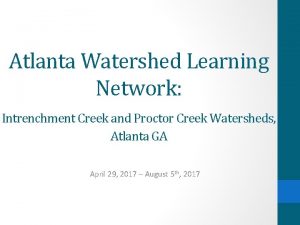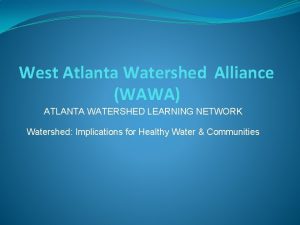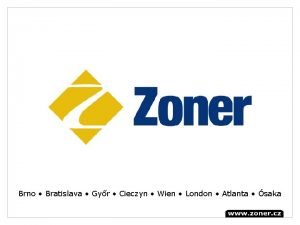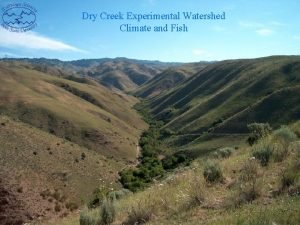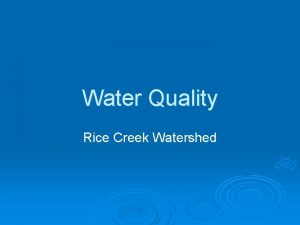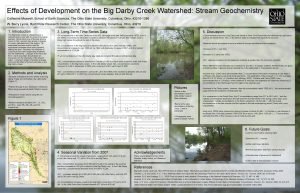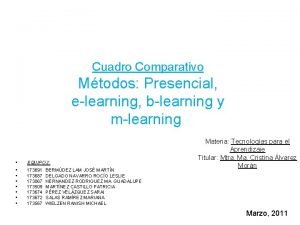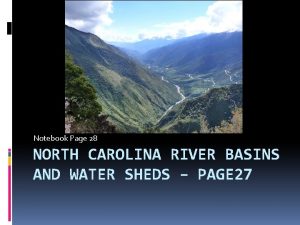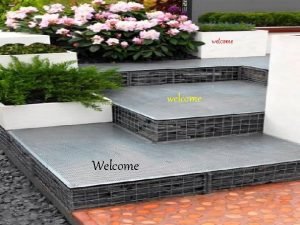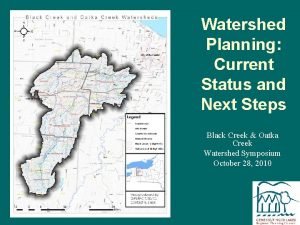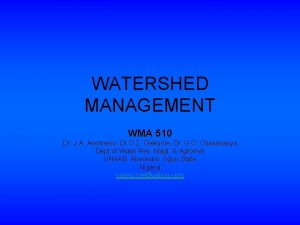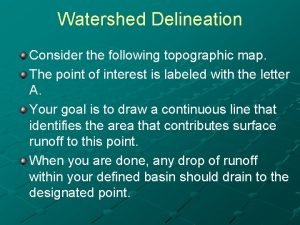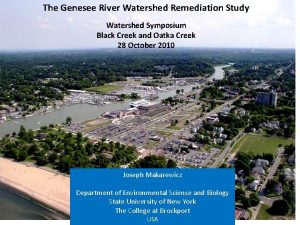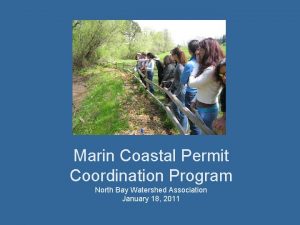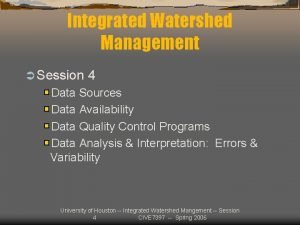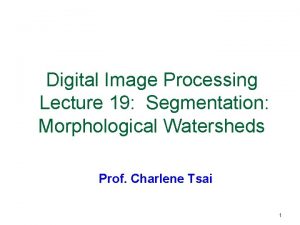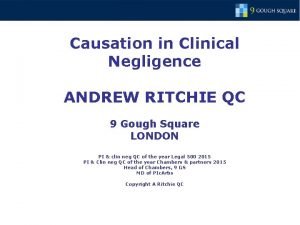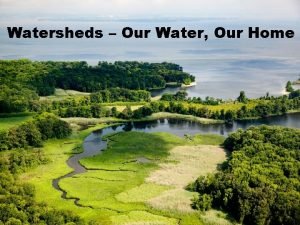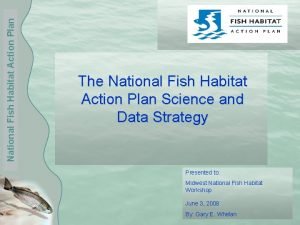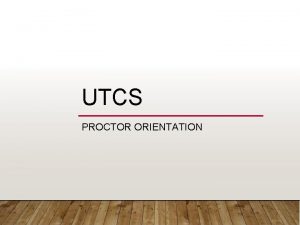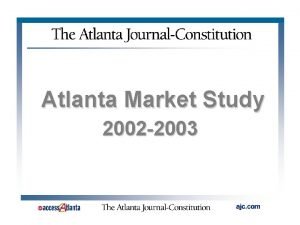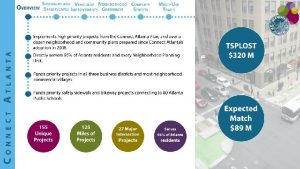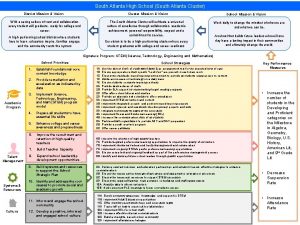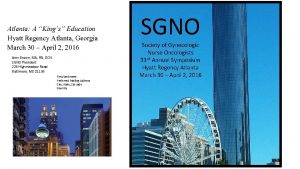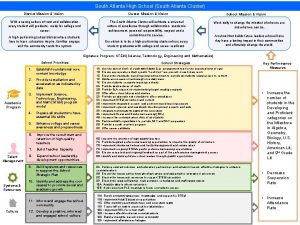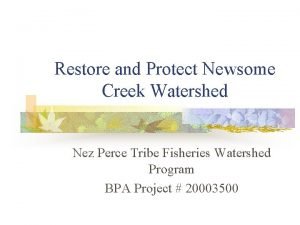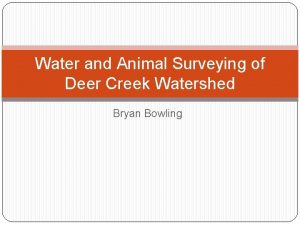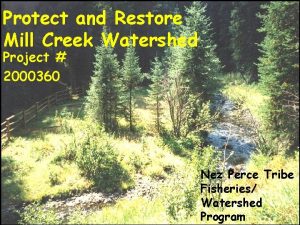Atlanta Watershed Learning Network Intrenchment Creek and Proctor



















- Slides: 19

Atlanta Watershed Learning Network: Intrenchment Creek and Proctor Creek Watersheds, Atlanta GA April 29, 2017 – August 5 th, 2017

Background Over the past few years, Environmental Community Action Inc. (ECO-Action) has collaborated with a number of partners to build capacity and develop leadership for green infrastructure in the Intrenchment and Proctor Creek watersheds including; • • • American Rivers (AR) West Atlanta Watershed (WAWA) The Conservation Fund (TCF) Park Pride (PP) Community Improvement Association (CIA) Metro Atlanta Urban Watershed Institute (MAUWI) This work has led to the creation of the Atlanta Watershed Learning Network.

“The Atlanta Watershed Learning Network’s collective purpose is to create symbolic and substantive programs that enhance community outreach and engagement for the development and use of new parks like Boone Park West, especially in urban watersheds. We also intend for the application of green infrastructure to address stormwater issues in Intrenchment and Proctor Creek watershed communities. ”

Purpose The immediate purpose is to increase community capacity for engagement with parks and green infrastructure as community assets that will: 1) Address flooding and stormwater issues; 2) Employ residents; 3) Provide opportunities for improved health, recreation and education; and 4) Protect the watershed. This engagement process will underscore equity, resiliency, and environmental justice in the planning and implementation of parks and green Infrastructure.

ECO-Action envisions the Atlanta Watershed Learning Network as an inwardlooking learning process that will grow resident participants to be leaders with the motivation, attitude, skills, knowledge (MASK) to inform and educate other residents and public/elected officials. These participants can then take action to address flooding and prevent/reduce water pollution. Simply put, we are building community capacity to support the use of green stormwater infrastructure (GSI), integrated water management, and other sustainable measures that can address flooding issues while also protecting the Intrenchment and Proctor Creek watersheds.

GOALS q The goal of this collaborative effort is to grow stewards and advocates from Intrenchment and Proctor Creek watersheds who will provide leadership for the protection of the watersheds. q Stewards will develop, implement and evaluate stewardship/advocacy projects that help mitigate the effects of urban stormwater runoff and urban blight and promote water conservation, green stormwater infrastructure and watershed protection in Intrenchment and Proctor Creek watersheds. q These stewards will also encourage others to become stewards and increase community power to influence policy in their respective watersheds. q Participants will be encouraged to focus on projects that connect residents with the new parks and green infrastructure projects that are being implemented in their respective watersheds.

Short Term Goals q. Work with the advocates from the Intrenchment Creek and Stewards of the Proctor Creek Stewardship Council to create a series of community forums and workshops around themes of understanding the watershed, green stormwater infrastructure, climate change, flooding environmental justice, and the role parks and greenspaces can play in supporting positive community-driven change. q. Enhance and then scale the Watershed Advocacy Training for Empowered and Resilient Communities (WATER Communities) model developed in SE Atlanta into other watersheds. q. Prepare and maximize opportunities for trainers and trainees to present together as a team at local gatherings and key professional development workshops and conferences

Short Term Goals (cont. ) q. Working with the Boone Park West Community Steering Committee, we will support the development of a park stewardship and maintenance plan for Boone Park West and create a training protocol that includes an engagement strategy between City of Atlanta (COA) Office of Park’s staff and residents. q. Work with COA Office of Sustainability with resources like Jennifer Carlisle Water Efficiency, COA Water Education with Kim Davis and COA Office of Resiliency to incorporate Sustainability initiatives into the programming. q. Work with COA Department of Watershed Management with resources like Susan Rutherford and Julie Owens to help with training or provide technical assistants as consultants.

Long Term Goals q. Work with the local community to implement the Living Cities Initiative (LCI) GSI recommendations and integrated stormwater management that will help address localized flooding around Turner Field and Falcon Stadium communities q. Advocate for advancement of the equitable implementation of GSI citywide q. Help the City of Atlanta improve their community engagement strategy by modeling a more authentic community engagement.

Participant Expectations Twelve (12) residents (six from each watershed) will be selected who meet the following requirements: q. A desire to become a steward and advocate for Green Stormwater Infrastructure (GSI) and Environmental Justice (EJ) in their neighborhoods; q. Reside in Intrenchment Creek and Proctor Creek Watersheds; q. Readiness to learn and be engaged in a safe learning environment q. Availability for all training sessions beginning with kickoff on Saturday, April 29 th and participation in six 2 -4 hour training and education sessions, one session every week from April to 2017;

Participant Expectations(cont. ) q. Commitment to complete a pre and post project evaluation; q. Commitment to complete a capstone project that addresses application of Green Infrastructure to address flooding and water quality issues in their watershed; q. Commitment to participate in an exit interview at the end of the training; q. Commitment to contribute a story to the Community Green Infrastructure Newsletter; and q. Completion of the Memorandum of Understanding (MOU) with ECOAction.

Proctor Creek is a nine-mile tributary of the Chattahoochee River, and is wholly contained within the City of Atlanta. It flows through 16 square miles of the following neighborhoods: q. English Avenue q. Vine City q. Mozley Park q. West Highlands q. Bankhead q. Maddox Park q. Grove Park q. Center Hill Park q. Carey Park q. Whittier Mill Village

q The Proctor Creek Watershed includes all the streams and rivers that are upstream and downstream to and from Proctor Creek. There are 9 separate watersheds within Proctor Creek. TIP: Think of a watershed as a giant bathtub that collects all the water in an area, and directs it into Proctor Creek, which then flows into the Chattahoochee River.

Why protect Proctor Creek? q. Atlanta obtains its drinking water from the Chattahoochee River. Since Proctor Creek flows directly into the Chattahoochee, pollution of the creek is a serious concern. q. When the ground is converted into hard surfaces like streets and sidewalks, water does not seep into the ground as it does with a natural surface like dirt or grass that can filter the water before it reaches a stream or groundwater. q. Instead, it runs along the street or sidewalk, picking up contaminants. These contaminants come from litter, animal waste, chemicals, and many other sources and are deposited into the watershed of Proctor Creek. q. Currently the Proctor Creek Watershed is not meeting State water quality standards for fecal coliform. Fecal coliform is a bacteria that indicates that potential harmful pathogens may be present in the waterbody. When a watershed is not meeting standards, it is called impaired; Proctor Creek Watershed is an impaired watershed.

Urban Waters Federal Partnership Proctor Creek was one of 11 new sites selected in 2013 for expanding the work of the Urban Waters Federal Partnership, a union of 13 federal agencies that focus on natural resources and economic development. The partnership is collaborating with community-led efforts to stimulate local economies, create local jobs, provide residents with skills and career options, improve quality of life, and protect Americans’ health by revitalizing urban waterways in underserved communities across the country. http: //www. urbanwaters. gov/

The Proctor Creek Stewardship Council (PCSC) is a grassroots group of individuals who live and work in the watershed. Concerned with protecting this critical water resource, and supported by partner organizations including: q West Atlanta Watershed Alliance q Community Improvement Association q Eco-Action q Westside Communities Alliance q National Wildlife Federation, q Georgia State University, The PCSC works to identify and advocate for solutions to challenges facing the watershed. The council’s aim is to preserve and enhance the unique cultural, recreational, natural resource, and ecological values of the entire watershed as an evolving community asset. www. proctorcreek. org

Intrenchment Creek INTRENCHMENT CREEK RUNS THROUGH THE HEART OF SOUTHEAST ATLANTA. IT ORIGINATES NEAR THE VERY CENTER OF THE CITY AND MEANDERS THROUGH THE SE QUADRANT UNTIL IT JOINS THE SOUTH RIVER AT 285.

THE WATER IN INTRENCHMENT CREEK IS SO DIRTY THAT IT MUST BE CLEANED BEFORE IT IS ALLOWED TO ENTER THE SOUTH RIVER.

Why protect Intrenchment Creek? q Natural streams contribute to their surroundings: sustaining life and maintaining environmental stability. q As more land becomes concrete, streams are intrenched (dug out and made more straight) to increase water removal from the area. q Intrenchment destroys the habitat of the waterway and encourages erosion. q With the natural flood plain altered, the concrete does not allow water to absorb into the soil. If the combined precipitation and runoff are not funneled out of the developed area quick enough, it can result in periodic flooding. q Pollutants from the developed area infect the stream and every waterway it joins on its journey to the sea.
 Intrenchment creek
Intrenchment creek Wawa atlanta
Wawa atlanta Atlanta watershed management
Atlanta watershed management Dry creek experimental watershed
Dry creek experimental watershed Rice creek watershed
Rice creek watershed Big darby creek watershed
Big darby creek watershed Bear creek watershed
Bear creek watershed Cuadro comparativo e-learning b-learning m-learning
Cuadro comparativo e-learning b-learning m-learning Difference between watershed and river basin
Difference between watershed and river basin Gabion structure watershed
Gabion structure watershed Components of a watershed
Components of a watershed Watershed management meaning
Watershed management meaning Contour map watershed delineation
Contour map watershed delineation Genesee river watershed
Genesee river watershed North bay watershed association
North bay watershed association Integrated watershed management
Integrated watershed management Watershed morphology
Watershed morphology 9 gough square
9 gough square Watershed poster ideas
Watershed poster ideas Local watershed definition
Local watershed definition
